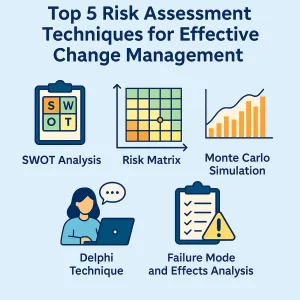Introduction
Mentorship can be defined as a relationship in which a more experienced individual provides guidance, support, and advice to a less experienced person. This relationship is significant for professional growth, as it not only helps mentees navigate the complexities of their roles but also fosters personal development and confidence in their abilities.
The landscape of entry-level project management jobs is increasingly competitive. With a growing number of graduates and professionals seeking to enter this field, standing out among peers can be challenging. In such an environment, having a mentor can provide a distinct advantage. Mentors can offer insights into industry trends, share valuable experiences, and help mentees develop essential skills that are often not taught in formal education settings.
Finding a mentor can yield numerous benefits for those starting their careers in project management. Mentors can assist in identifying career goals, navigating corporate culture, and building a professional network. They can also help mentees avoid common pitfalls and rookie mistakes, ensuring a smoother transition into the workforce. Ultimately, mentorship is not just about guidance; it is about building a foundation for a successful and fulfilling career in project management.
Understanding the Role of a Mentor
Mentorship plays a crucial role in shaping the careers of emerging professionals. As you embark on your journey into this field, understanding the nuances of mentorship can significantly enhance your professional development. Here’s a closer look at what mentorship entails, particularly in the context of project management.
Difference Between a Mentor and a Coach
While both mentors and coaches aim to foster professional growth, their approaches and focuses differ:
- Mentor: A mentor is typically a more experienced individual who provides guidance, support, and advice based on their own career experiences. They often share insights about navigating the complexities of the industry, helping mentees understand the broader context of their roles and responsibilities. Mentorship is usually a long-term relationship that evolves over time, focusing on personal and professional development.
- Coach: In contrast, a coach is often hired for a specific purpose, such as improving particular skills or achieving short-term goals. Coaches may employ structured methodologies and techniques to enhance performance in specific areas, such as project management methodologies or leadership skills. The relationship is generally more formal and time-bound compared to mentorship.
Various Roles a Mentor Can Play
Mentors can take on multiple roles that are beneficial for emerging project managers:
- Advisor: Mentors provide valuable advice on career paths, project management practices, and industry standards. They can help you set realistic goals and develop a roadmap for achieving them.
- Sounding Board: A mentor serves as a sounding board for your ideas and concerns. They can offer constructive feedback and help you refine your thoughts, which is particularly useful when facing challenges in your projects.
- Network Connector: Mentors often have extensive professional networks. They can introduce you to key industry contacts, opening doors to new opportunities and collaborations that can be pivotal in your career advancement.
Practical Insights and Industry Knowledge
One of the most significant advantages of having a mentor in project management is the access to practical insights and industry knowledge:
- Real-World Experience: Mentors can share their firsthand experiences, including successes and failures, which can provide you with a realistic perspective on what to expect in your career. This knowledge can help you avoid common pitfalls and make informed decisions.
- Navigating Corporate Culture: Understanding the nuances of corporate culture is essential for success in project management. A mentor can guide you through the intricacies of your organization, helping you establish credibility and navigate relationships effectively.
- Skill Development: Mentors can identify areas for improvement and suggest resources or strategies to enhance your skills. This guidance is invaluable as you seek to build a strong foundation in project management practices.
Why Mentorship Matters for Emerging Project Managers
Entering the field of project management can be both exciting and daunting for emerging professionals. One of the most effective ways to navigate this early stage of your career is through mentorship. Here are several key benefits that mentorship provides to those starting in project management:
- Facilitates Skill Development and Knowledge Transfer: A mentor can play a crucial role in helping you acquire essential skills and knowledge specific to project management. They can provide insights into best practices, tools, and methodologies that are vital for success in the field. This personalized guidance can accelerate your learning curve and enhance your competency in managing projects effectively [1][5].
- Enhances Networking Opportunities and Professional Connections: Mentorship often opens doors to valuable networking opportunities. A mentor can introduce you to their professional network, which may include experienced project managers, industry leaders, and potential employers. These connections can be instrumental in finding job opportunities and gaining insights into the industry [3][7].
- Boosts Confidence and Provides Moral Support: Starting a career in project management can be challenging, and having a mentor can significantly boost your confidence. They can offer encouragement and moral support during difficult times, helping you to overcome obstacles and stay motivated. This support is particularly important when facing the pressures of managing projects and meeting deadlines [2][4].
- Offers Guidance on Navigating Organizational Culture and Politics: Understanding the dynamics of an organization is crucial for success in project management. A mentor can provide valuable advice on how to navigate the organizational culture and politics, helping you to build effective relationships with team members and stakeholders. This guidance can be essential in ensuring that your projects are successful and that you are able to work collaboratively within your organization [6][8].
How to Find a Mentor in Project Management
Finding a mentor can be a pivotal step in launching your career in project management. A mentor can provide invaluable guidance, share experiences, and help you navigate the complexities of the field. Here are actionable steps to identify and approach potential mentors effectively:
1. Identify Your Goals and What You Seek in a Mentor
Before reaching out to potential mentors, take the time to outline your career goals. Consider what specific skills or knowledge you want to gain from a mentor. This clarity will help you articulate your needs when you approach someone. Think about the type of mentoring relationship you desire—whether you need someone for quick career advice, regular meetings, or assistance in networking within the industry [3][7].
2. Leverage Professional Networks, LinkedIn, and Industry Events
Utilize platforms like LinkedIn to connect with professionals in project management. Join relevant groups and participate in discussions to increase your visibility. Attend industry events, workshops, and seminars where you can meet experienced project managers. Engaging in these environments can lead to organic connections with potential mentors who share your interests and career aspirations [5][8].
3. Consider Approaching Mentors Within Your Current Organization
If you are already employed, look for mentors within your organization. Many companies have formal mentoring programs, so inquire with your manager or the Project Management Office (PMO) about available options. If a program exists, they can help match you with a mentor who aligns with your professional goals. If not, identify individuals in your workplace whose career paths you admire and consider reaching out to them directly [1][2][8].
4. Utilize Mentorship Programs Offered by Professional Associations or Educational Institutions
Many professional associations and educational institutions offer structured mentorship programs. These programs can connect you with experienced professionals who are willing to share their knowledge and insights. Research organizations related to project management, such as the Project Management Institute (PMI), to find mentorship opportunities that suit your needs [4][9].
By following these steps, you can effectively find a mentor who will support your growth in project management. A strong mentoring relationship can provide you with the guidance and confidence needed to navigate the early stages of your career successfully.
Building a Strong Mentor-Mentee Relationship
Establishing a solid mentor-mentee relationship is crucial for emerging professionals in project management, especially when seeking entry-level positions. A mentor can provide invaluable guidance, support, and insights that can significantly impact your career trajectory. Here are some key points to consider when cultivating this important relationship:
- Set Clear Expectations and Goals: At the outset of your mentorship, it is essential to discuss and agree on specific goals and expectations. This includes identifying what you hope to achieve through the mentorship, such as skill development, networking opportunities, or industry insights. By setting targeted goals, both you and your mentor can measure success and stay focused on your objectives [3][6].
- Communicate Regularly and Be Open to Feedback: Regular communication is vital for a successful mentor-mentee relationship. Schedule consistent check-ins to discuss your progress, challenges, and any new developments in your career. Being open to feedback is equally important; constructive criticism can help you grow and improve your project management skills [4][8].
- Show Appreciation and Respect for the Mentor’s Time and Insights: Acknowledge the effort and time your mentor invests in your development. Expressing gratitude not only strengthens your relationship but also demonstrates your respect for their expertise. Simple gestures, such as sending a thank-you note or sharing your successes, can go a long way in fostering goodwill [2][9].
- Be Proactive in Seeking Advice and Sharing Progress: Take the initiative to reach out to your mentor for advice on specific challenges you face in your career. Additionally, keep them updated on your progress and achievements. This proactive approach not only shows your commitment to your professional growth but also keeps your mentor engaged and invested in your journey [1][10].
By actively cultivating a strong mentor-mentee relationship, you can navigate the complexities of starting your career in project management more effectively. Mentorship can provide you with the tools, insights, and confidence needed to succeed in your entry-level role and beyond.
Overcoming Challenges in Finding a Mentor
Finding a mentor in project management can be a transformative step for emerging professionals, yet many face significant challenges in this pursuit. Here are some common obstacles and practical solutions to help you navigate the mentorship landscape effectively.
1. Feelings of Intimidation or Inadequacy
Many individuals feel intimidated when reaching out to potential mentors, often doubting their qualifications or fearing that they may not be worthy of a mentor’s time. This feeling of inadequacy can stem from:
- Comparing Yourself to Others: It’s easy to feel less experienced or knowledgeable than established professionals. Remember, every expert was once a beginner.
- Fear of Rejection: The thought of being turned down can be daunting, leading to hesitation in making the first move.
Solutions:
- Acknowledge Your Value: Reflect on your unique experiences and skills. Understand that you bring a fresh perspective that can be valuable to a mentor.
- Start Small: Consider initiating contact through informal channels, such as social media or professional networking events, where the pressure is lower.
2. Overcoming Rejection and Staying Motivated
Rejection is a common part of the mentorship search, and it can be disheartening. However, it’s essential to view rejection as a stepping stone rather than a setback.
Tips for Resilience:
- Reframe Rejection: Instead of viewing it as a personal failure, see it as an opportunity to learn. Ask for feedback if appropriate, and use it to refine your approach.
- Diversify Your Outreach: Don’t limit yourself to one potential mentor. Reach out to multiple individuals in your field to increase your chances of finding a match.
3. The Importance of Persistence and Adaptability
The journey to finding a mentor is rarely straightforward. It requires persistence and the ability to adapt your approach based on feedback and experiences.
Key Strategies:
- Set Clear Goals: Define what you hope to achieve through mentorship. This clarity will help you communicate your intentions effectively to potential mentors.
- Be Open to Different Mentorship Styles: Not every mentor will fit your initial expectations. Be willing to adapt and learn from various individuals, as each can offer unique insights and guidance.
The Long-Term Impact of Mentorship on Your Career
Mentorship plays a crucial role in shaping the careers of emerging professionals, particularly in the field of project management. As you embark on your journey into this dynamic industry, understanding the long-term benefits of mentorship can significantly influence your career trajectory. Here are some key points to consider:
- Statistics Highlighting the Benefits of Mentorship: Research indicates that individuals with mentors are more likely to receive promotions and salary increases compared to those without. A study found that 70% of mentees reported increased job satisfaction and 60% of them received a promotion within a year of having a mentor. This demonstrates that mentorship not only enhances skills but also opens doors to career advancement opportunities [1][11].
- Pathway to Future Opportunities: Mentorship can serve as a catalyst for future opportunities. A mentor can provide valuable insights into the industry, share their network, and guide you through the complexities of project management. This relationship often leads to introductions to key stakeholders and potential employers, which can be instrumental in securing leadership roles later in your career. Many successful project managers attribute their career growth to the guidance and support they received from their mentors [2][8].
- Encouraging Mentees to Become Mentors: As you progress in your career, it is essential to recognize the importance of giving back to the community. By becoming a mentor yourself, you can help guide the next generation of project managers. This not only reinforces your own knowledge and skills but also fosters a culture of support and collaboration within the industry. Mentoring others can lead to personal growth and fulfillment, as you witness the impact of your guidance on their careers [3][9].
Conclusion
In the journey of becoming a successful project manager, mentorship plays a pivotal role, especially for those just starting their careers. The benefits of having a mentor are manifold:
- Guidance and Support: Mentors provide invaluable insights and advice, helping early-career project managers navigate the complexities of their roles. They can share their experiences and lessons learned, which can significantly shorten the learning curve for newcomers in the field [10][12].
- Networking Opportunities: A mentor often has an established network that can open doors to job opportunities and professional connections. This can be particularly beneficial for emerging professionals who may not yet have a robust professional network [14].
- Skill Development: Through mentorship, individuals can identify the skills they need to develop to advance their careers. Mentors can offer constructive feedback and help mentees set realistic career goals [3][10].
- Increased Job Satisfaction: Research indicates that individuals with mentors report higher job satisfaction. This is likely due to the support and encouragement they receive, which fosters a sense of belonging and purpose in their work [14].
As you consider your path in project management, it is essential to take proactive steps in seeking mentorship. Start by identifying potential mentors within your network or industry. Reach out with a genuine expression of interest in their work and a request for guidance. Remember, the worst that can happen is a polite decline, but the potential benefits are immense [15].
In conclusion, investing in your career development through mentorship is a powerful strategy. Embrace the opportunity to learn from those who have walked the path before you. By seeking out a mentor, you are not only enhancing your professional skills but also setting yourself up for a fulfilling and successful career in project management. Take that first step today—your future self will thank you!
Find out more about Shaun Stoltz https://www.shaunstoltz.com/about/.
This post was written by an AI and reviewed/edited by a human.



